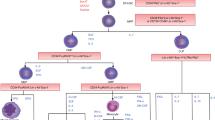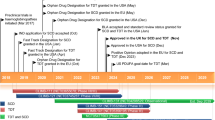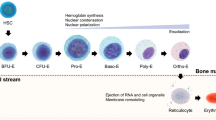Abstract
Evidence has emerged that mesenchymal stem cells (MSCs) represent a promising cell population for supporting new clinical cellular therapies. Currently, bone marrow represents the main source of MSCs, but their differentiation capacity declines with age. We have identified possible novel multilineage mesenchymal cells from human placenta. In addition to their multilineage differentiation, they have a direct immunosuppressive effect on proliferation of T lymphocytes from human adult peripheral blood (PB) and umbilical cord blood (UCB) in vitro. This immunoregulatory feature strongly implies that they have a potential application in allograft transplantation. Since placenta and UCB can be obtained from the same donor, placenta is an attractive source of MSCs for co-transplantation in conjunction with UCB-derived hematopoietic stem cells to reduce the potential of graft-versus-host disease in recipients. However, the way that they modulate the immune system is unclear. In this investigation, we have addressed the effects of human placental MSCs on various subtypes of UCB-derived and PB-derived T lymphocytes.










Similar content being viewed by others
References
Aggarwal S, Pittenger M (2005) Human mesenchymal stem cells modulate allogeneic immune cell responses. Blood 105:1815–1822
Augello A, Tasso R, Negrini S, Amateis A, Indiveri F, Cancedda R, Pennesi G (2005) Bone marrow mesenchymal progenitor cells inhibit lymphocyte proliferation by activation of the programmed death 1 pathway. Eur J Immunol 35:1482–1490
Bancroft JD, Cook HC (1984) Manual of histological techniques. Churchill Livingstone, Edinburgh
Barry F, Boynton R, Haynesworth S, Murphy J, Zaia J (1999) The monoclonal antibody SH-2, raised against human mesenchymal stem cells, recognizes an epitope on endoglin (CD105). Biochem Biophys Res Commun 265:134–139
Barry F, Boynton R, Murphy M, Haynesworth S, Zaia J (2001) The SH-3 and SH-4 antibodies recognize distinct epitopes on CD73 from human mesenchymal stem cells. Biochem Biophys Res Commun 289:519–524
Bartholomew A, Sturgeon C, Siatskas M, Ferrer K, McIntosh K, Patil S, Hardy W, Devine S, Ucker D, Deans R, Moseley A, Hoffman R (2002) Mesenchymal stem cells suppress lymphocyte proliferation in vitro and prolong skin graft survival in vivo. Exp Hematol 30:42–48
Beyth S, Borovsky Z, Mevorach D, Liebergall M, Gazit Z, Aslan H, Galun E, Rachmilewitz J (2005) Human mesenchymal stem cells alter antigen-presenting cell maturation and induce T-cell unresponsiveness. Blood 105:2214–2219
Bruijn M de, Speck N, Peeters M, Dzierzak E (2000) Definitive hematopoietic stem cells first develop within the major arterial regions of the mouse embryo. EMBO J 19:2465–2474
Campagnoli C, Roberts IA, Kumar S, Bennett PR, Bellantuono I, Fisk NM (2001) Identification of mesenchymal stem/progenitor cells in human first-trimester fetal blood, liver, and bone marrow. Blood 98:2396–2402
Conget P, Minguell J (1999) Phenotypical and functional properties of human bone marrow mesenchymal progenitor cells. J Cell Physiol 181:67–73
Deans R, Moseley A (2000) Mesenchymal stem cells: biology and potential clinical use. Exp Hematol 28:875–884
Di Nicola M, Carlo-Stella C, Magni M, Milanesi M, Longoni PD, Matteucci P, Grisanti S, Gianni AM (2002) Human bone marrow stromal cells suppress T-lymphocyte proliferation induced by cellular or nonspecific mitogenic stimuli. Blood 99:3838–3843
Klyushnenlova E, Mosca J, McIntosh K (1998) Human mesenchymal stem cells suppress allogeneic T cell responses in vitro: implications for allogeneic transplantation. Blood 92:642a
Krampera M, Glennie S, Dyson J, Scott D, Laylor R, Simpson E, Dazzi F (2003) Bone marrow mesenchymal stem cells inhibit the response of naive and memory antigen-specific T cells to their cognate peptide. Blood 101:3722–3729
Lazarus H, Curtin P, Devine S (2000) Role of mesenchymal stem cells (MSC) in allogeneic transplantation: early phase I clinical results. Blood 392:1691
Lee R, Kim B, Choi I, Kim H, Choi H, Suh K, Bae Y, Jung J (2004) Characterization and expression analysis of mesenchymal stem cells from human bone marrow and adipose tissue. Cell Physiol Biochem 14:311–324
Li CD, Zhang WY, Li HL, Jiang XX (2005) Mesenchymal stem cells derived from human placenta suppress allogeneic umbilical cord blood lymphocyte proliferation. Cell Res 15:539–547
Liechty K, MacKenzie T, Shaaban A, Radu A, Moseley A, Deans R, Marshak D, Flake A (2000) Human mesenchymal stem cells engraft and demonstrate site-specific differentiation after in utero transplantation in sheep. Nat Med 6:1282–1286
Macatonia S, Hosken N, Litton M, Vieira P, Hsieh C, Culpepper J, Wysocka M, Trinchieri G, Murphy K, O’Garra A (1995) Dendritic cells produce IL-12 and direct the development of Th1 cells from naive CD4+ T cells. J Immunol 154:5071–5079
Mitchell K, Weiss M, Mitchell IB (2003) Matrix cells from Wharton’s jelly form neurons and glia. Stem Cells 21:50–60
Pittenger M, Mackay A, Beck S, Jaiswal R, Douglas R, Mosca J, Moorman M, Simonetti D, Craig S, Marshak D (1999) Multilineage potential of adult human mesenchymal stem cells. Science 284:143–147
Ralf H (2000) Isolation of primary and immortalized CD34− hematopoietic and mesenchymal stem cells from various sources. Stem Cells 18:1–9
Rao M, Mattson M (2001) Stem cells and aging: expanding the possibilities. Mech Aging Dev 122:713–734
Resnik D (2002) The commercialization of human stem cells: ethical and policy issues. Health Care Anal 10:127–154
Steinborn A, Gall C von, Hildenbrand R, Stutte H, Kaufmann M (1998) Identification of placental cytokine-producing cells in term and preterm labor. Obstet Gynecol 91:329–335
Toma C, Pittenger M, Cahill K, Byrne B, Kessler P (2002) Human mesenchymal stem cells differentiate to a cardiomyocyte phenotype in the adult murine heart. Circulation 105:93–98
Zhang Y, Li CD, Jiang XX, Li HL, Tang PH, Mao N (2004) Comparison of mesenchymal stem cells from human placenta and bone marrow. Chin Med J (Engl) 117:882–887
Zhao L, Duan W, Reyes M, Keene C, Verfaillie C, Low W (2002) Human bone marrow stem cells exhibit neural phenotypes and ameliorate neurological deficits after grafting into the ischemic brain of rats. Exp Neurol 174:11–20
Author information
Authors and Affiliations
Corresponding author
Additional information
This study was supported by a grant from the National Natural Science Foundation (no. 30571949), by the Beijing Nova Star program, by the Beijing Elitist Fund (20051D0301029), and by the Beijing Obstetrics and Gynecology Hospital.
Rights and permissions
About this article
Cite this article
Li, C., Zhang, W., Jiang, X. et al. Human-placenta-derived mesenchymal stem cells inhibit proliferation and function of allogeneic immune cells. Cell Tissue Res 330, 437–446 (2007). https://doi.org/10.1007/s00441-007-0504-5
Received:
Accepted:
Published:
Issue Date:
DOI: https://doi.org/10.1007/s00441-007-0504-5




